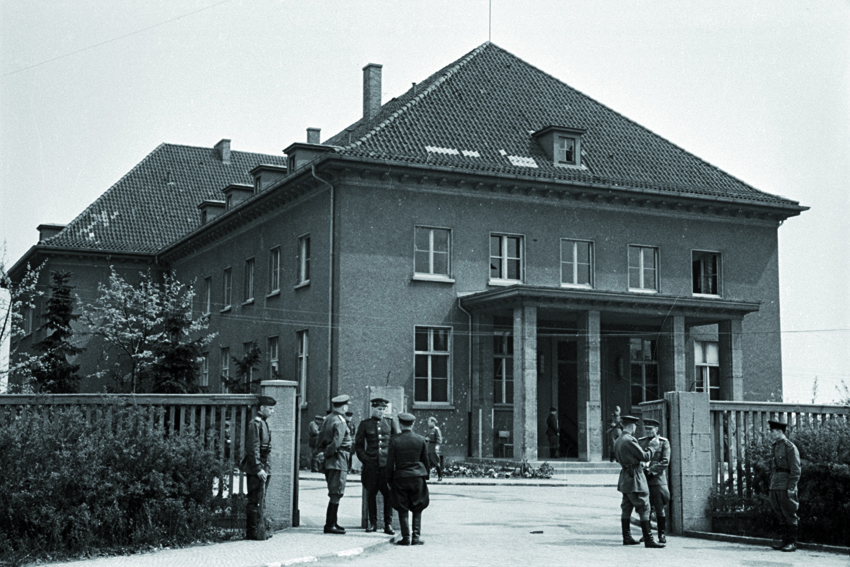The museum

Place of surrender May 1945 © Museum Berlin-Karlshorst | Harry Schnitger
Who we are
Museum Berlin-Karlshorst is located at an historic site. It is a byword for the end of the second world war in 1945 and the post-war period in Europe. Today, the museum presents various points of view on German-Soviet history in the 20th century. It is unique in Germany for having a multinational board of trustees. The museum facilitates encounters and an interchange of thoughts about history and its past and present commemoration.
Four nations are involved in the work of the museum: the Federal Republic of Germany, the Russian Federation, the Ukraine and the Republic of Belarus.
The Museum Berlin-Karlshorst is 100 percent financed by the Federal Commissioner for Culture and the Media of Germany.

Site of the unconditional surrender of the Wehrmacht, former officers’ mess of Pioneer School I, in Berlin-Karlshorst, 8 May 1945 © Museum Berlin-Karlshorst | Photo: Timofej Melnik
The history of the museum dates back to 1967. On the 50th anniversary of the October Revolution on 7 November 1967, the museum was founded as the “Museum of the Unconditional Surrender of Fascist Germany in the Great Patriotic War 1941-1945” (in short, the “Surrender Museum”). The aim was to build a space of commemoration of the heroic deeds of the Red Army at the historical site. While the museum was initially only open to Soviet soldiers, it was later also open to the public.
With the withdrawal of Soviet/Russian troops from Germany in 1990-1994, the museum’s existence was threatened, but the German and Soviet sides agreed on its continued use. From 1991 onwards, a German-Soviet, later German-Russian expert commission worked out a concept for a new permanent exhibition. On 10 May 1995, on the 50th anniversary of the end of the war in Europe, the new museum was finally opened. In 1997, another nation was added to the initially exclusively German-Russian association with the then “Museum of the Great Patriotic War” (today: Museum of Ukraine in the Second World War) in Kiev, before the current sponsorship of four nations was sealed one year later with the admission of the “Museum of the Great Patriotic War” in Minsk. After a complete overhaul of the permanent exhibition, we opened our new permanent exhibition “Germany and the Soviet Union in World War II” in 2013, which has enjoyed a lively reception ever since.
The museum is the only one in Germany with a permanent exhibition commemorating the war of extermination against the Soviet Union.
Board of trustees „Museum Berlin-Karlshorst e.V.“
The Museum Berlin-Karlshorst is a non-profit association that currently has 17 institutional members. The members of the association include the Federal Republic of Germany, the Russian Federation (RF) and renowned scientific and cultural institutions in Germany, Russia, Belarus and Ukraine.
Executive board
German Historical Museum, Berlin
The Central Museum of Armed Forces, Moscow
Members
Cultural Ministry of the Russian Federation
Defense Ministry of the Russian Federation
Foreign Ministry of the Russian Federation
German Federal Foreign Office
German Federal Ministry of Defense
Institute of Contemporary History (IfZ)
National museum of the history of Ukraine in the Second World War. Memorial complex, Kiev
Russian State Museum of the History of the Great Patriotic War 1941-1945, Moscow
Saxon Memorials Foundation
State Historical Museum, Moscow
State Minister of Cultural Affairs and the Media in the German Federal Chancellery
The Bundeswehr Military History Museum, Dresden
The Lord Mayor of Berlin, Senat Chancellery – Cultural Affairs
Topography of Terror, Berlin
World War II Great Patriotic War Museum, Minsk
Scientific Advisory Board
nominated members of the Scientific Advisory Board are:
Chairman of the Advisory Board
Prof. Dr. Thomas Sandkühler (Berlin)
Members
Prof. Dr. Anke Hilbrenner (Göttingen)
Prof. Dr. Beate Fieseler (Düsseldorf)
Prof. Dr. Stefan Creuzberger (Rostock)
Prof. Dr. Tatjana Tönsmeyer (Wuppertal)
Dr. Evgeny Artemov (St. Petersburg)
Natalia Kalantarova (Krasnogorsk)
Oleg Pankov (Podolsk)
Dr. Victor Skryabin (Moscow)
Prof. Dr. Alla Kirilina (Moscow)
Veronika Skok (Minsk)
Oleksandr Lysenko (Kiev)